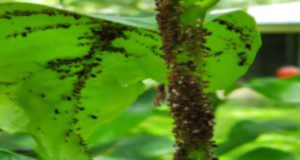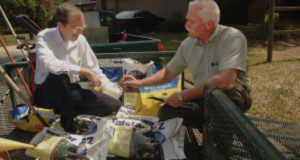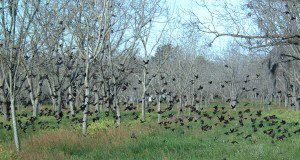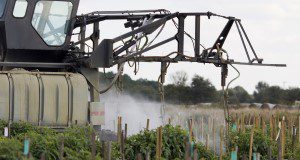Interest around pesticides and possible alternatives to them have increased in recent years. As individuals seek out possible alternatives, some consider making their own solutions to pest control. Homemade pesticide recipes abound online and are commonly seen in various social media platforms. This new 3-page publication of the UF/IFAS Pesticide Information Office looks at the legality of these mixes, when and where they can be used, and what other considerations need to be taken into account when utilizing these mixes. Written by Brett Bultemeier and Jason Ferrell.
https://edis.ifas.ufl.edu/pi288
Tag: Pesticides
Rodenticides
Rodenticides are pesticides designed to kill rodents, primarily mice and rats. However, rodents are not the only species that can be poisoned by rodenticides. Practically any mammal, including humans, can suffer severe effects from unintentional exposure to rodenticides. Rodenticides vary widely in the hazard they present even though they are all designed to kill animals that are physiologically comparable to humans. This new 4-page publication of the UF/IFAS Pesticide Information Office addresses those hazards for rodenticides currently registered in Florida. Written by Frederick M. Fishel.
https://edis.ifas.ufl.edu/pi284
Restricted Use Pesticides for Use in Florida
All pesticides are classified according to their toxicity, use pattern, and environmental effects. The two main classifications are unclassified use and restricted use, though unclassified pesticides are commonly referred to as general use pesticides. A restricted use pesticide is one that is for retail sale to and use by only certified applicators or persons under their direct supervision and only for those purposes covered by the applicator’s certification. This document will provide a listing of pesticide active ingredients registered in Florida that are classified as restricted and the reason(s) for the restricted use classification. This 4-page major revision was written by Frederick M. Fishel and published by the UF/IFAS Pesticide Information Office.
https://edis.ifas.ufl.edu/pi073
Avicides
By and large, birds are beneficial because they provide enjoyment and recreation to humans and are vital to ecosystem balance. However, occasionally some species can compete with human interests. When these situations occur, some forms of control may become necessary. Avicides are pesticides designed to kill or repel pest birds. This new 2-page document addresses those avicides currently registered for use in Florida. Written by Frederick M. Fishel and published by the UF/IFAS Pesticide Information Office.
https://edis.ifas.ufl.edu/pi281
Pesticide Recordkeeping Form for Florida Applicators
This new 5-page document provides a form containing the required elements to include on a record of pesticide application for meeting the restricted use pesticide and Worker Protection Standard (WPS) requirements. An example application record and an explanation of the required elements is provided. This is not a required form because there are other methods to keep records if they contain the required information. Handwritten notes, electronic records, and other recordkeeping software systems are also acceptable. Written by Frederick M. Fishel and published by the UF/IFAS Agronomy Department.
http://edis.ifas.ufl.edu/pi280
Clasificacion de las licencias para aplicadores dictadas por el Departamento de Agricultura y Servicios al Consumidor del estado de la Florida (FDACS), relacionadas con agricultura y control de plagas
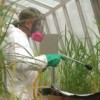 Esta guía ofrece una explicación de las licencias para aplicadores de pesticidas privados, públicos y comerciales emitidos por FDACS en el Capítulo 487 de los Estatutos de la Florida. This 4-page fact sheet is the Spanish language version of Agricultural and Related Pest Control Applicator License Classifications under the Florida Department of Agriculture and Consumer Services (FDACS). Written by Frederick M. Fishel and Tatiana Sanchez, and published by the UF Department of Agronomy, February 2014.
Esta guía ofrece una explicación de las licencias para aplicadores de pesticidas privados, públicos y comerciales emitidos por FDACS en el Capítulo 487 de los Estatutos de la Florida. This 4-page fact sheet is the Spanish language version of Agricultural and Related Pest Control Applicator License Classifications under the Florida Department of Agriculture and Consumer Services (FDACS). Written by Frederick M. Fishel and Tatiana Sanchez, and published by the UF Department of Agronomy, February 2014.
http://edis.ifas.ufl.edu/pi249
Pesticide Use Trends in the U.S.: A 25-Year U.S. Summary (PI142/PI179)
The EPA, in cooperation with the USDA and FDA, is responsible for regulating the production and use of pesticides in the U.S. This revised 8-page fact sheet provides data on volumes used and sales of pesticides from EPA survey data available for the 25-year period, 1982 – 2007. Written by F.M. Fishel and published by the UF Department of Agronomy, February 2011.
http://edis.ifas.ufl.edu/pi179
Pesticide Use Trends in the U.S.: Pesticides for Industrial/Commercial/Governmental Uses (PI141/PI178)
This revised 4-page fact sheet focuses on pesticides used by the industrial/commercial/governmental market sector, providing data on volumes used and sales of pesticides from the latest EPA survey data available, 2006 – 2007. Written by F.M. Fishel, and published by the UF Department of Agronomy, February 2011.
http://edis.ifas.ufl.edu/pi178
Pesticide Use Trends in the U.S.: Agricultural Pesticides (PI139/PI176)
This revised 4-page fact sheet focuses on the agricultural pesticides market sector, providing data on volumes used and sales of pesticides from the latest EPA survey data available, 2006 – 2007. Written by F.M. Fishel, and published by the UF Department of Agronomy, February 2011.
http://edis.ifas.ufl.edu/pi176
